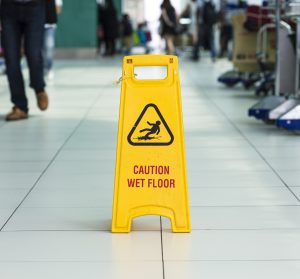Hurt on Another Person’s Property?
New Jersey Premises Liability Attorney Explains Injuries and Legal Options
 Premises liability laws place a responsibility on property owners to keep their properties safe for invitees and other visitors. This duty of reasonable care requires owners to fix safety hazards as well as warn visitors of any potential dangers. When property owners neglect this duty, serious slip and fall accidents and other injuries may result. However, if you are hurt by unsafe conditions on someone else’s property, you may be able to hold the owner responsible for your injuries and damages.
Premises liability laws place a responsibility on property owners to keep their properties safe for invitees and other visitors. This duty of reasonable care requires owners to fix safety hazards as well as warn visitors of any potential dangers. When property owners neglect this duty, serious slip and fall accidents and other injuries may result. However, if you are hurt by unsafe conditions on someone else’s property, you may be able to hold the owner responsible for your injuries and damages.
Premises liability claims are often complicated by the fact that there is no universal standard for safe property conditions. Each case is different and therefore requires evidence and arguments to prove an owner’s negligence. A New Jersey premises liability attorney from Keefe Law Firm can help ensure that you have the best chance of success with your lawsuit. Our lawyers have experience with many different types of premises liability claims and have secured many successful verdicts and settlements for victims. In one case, we obtained a settlement of $1 million for the family of a victim whose wrongful death resulted from property owner negligence.
What is Duty of Reasonable Care?
In premises liability claims, “duty of reasonable care” refers to the property owner’s responsibility to ensure a safe environment for invitees and other visitors. In general, this means that those who own businesses, homes or other property must fix hazards and conditions that might cause serious injuries to another person. This includes preventing slip and fall accidents, as well as dog bites and other injuries from hazardous conditions or negligent security. However, a property owner’s duty of care may be different for various types of visitors, which include:
- Invitees, such as business customers. Generally, an invitee is anyone who visits the property for the owner’s benefit. For example, most people who enter a store are invitees because they are there to potentially make a purchase. Property owners owe the highest duty of reasonable care to invitees. This means they must take all possible steps to eliminate hazards like spills, unsafe stairways, poor lighting and other dangers.
- Licensees, such as social guests. Licensees are those who visit the property primarily for their own benefit, such as a party guest. Property owners owe a lesser duty of care to licensees. Usually, a property owner can be held accountable for a licensee’s injuries only if the owner knew or should have known about the reasonably dangerous conditions, and also failed to warn visitors to exercise caution.
- Trespassers, which refers to anyone who enters the property without express or implied permission. In most situations, a property owner owes no duty of care to trespassers. However, special exceptions exist for child trespassers who may wander onto the property. In certain cases, owners can be liable for a child’s injuries, such as when the owner fails to put protective fencing around a swimming pool to prevent child drownings.
Do I Have a Premises Liability Lawsuit?
Not every accident that happens on someone else’s property may be grounds for a premises liability claim. To have a successful claim, you and your premises liability attorney must prove:
- The person you are seeking damages from owns, occupies or is otherwise legally responsible for the property. In certain cases, the party leasing the property from the owner may be the one liable for accidents and damages. However, it depends on the terms of the lease.
- The owner breached the duty of reasonable care. This is often the most difficult point to prove, as duty of care is often unique to each situation.
- The owner’s negligence caused or contributed to your accident and injuries. If the dangerous condition on the property was not a significant factor in your accident, you likely do not have a claim. This includes situations where you might use the property in a way that the owner cannot reasonably foresee. For example, a property owner may neglect to fix an unstable fence. If the fence falls on you while you are walking beside it, you likely have a claim. However, if your injuries resulted from trying to climb over the fence, you probably do not have a claim.
- You sustained actual injuries or damages. As with all personal injury claims, you generally cannot file a premises liability lawsuit if you were not physically or monetarily harmed by the owner’s negligence.
Slip and Fall Accident? Call a New Jersey Premises Liability Attorney
If you or a loved one sustains injuries due to negligence on someone else’s property, you deserve fair compensation for your medical bills and other expenses. A New Jersey premises liability attorney from our personal injury law firm can start investigating your accident immediately. We can use our experience with this area of law to argue your case and give you the best chance of recovering compensation.
We accept cases nationwide from our New Jersey law offices in Red Bank, Newark, Point Pleasant and New Brunswick. Additionally, we operate on contingency fee arrangements, meaning that you pay us nothing unless you win your case. We also offer reduced fees for cases involving child injuries. Call today to schedule your free initial consultation.